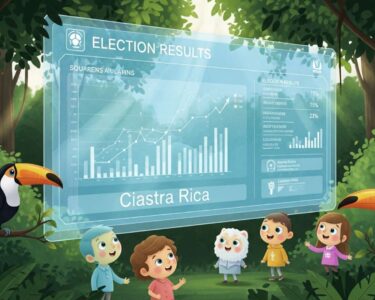San José, Costa Rica — A groundbreaking new protocol developed by the University of Costa Rica’s (UCR) Postgraduate Studies System is transforming how breast milk is collected and delivered to hospitals, prioritizing safety and quality for newborns in need.
Born out of necessity during the COVID-19 pandemic, when donor mothers faced challenges accessing milk banks, the initiative, spearheaded by M.Sc. Diana Víquez Barrantes, a graduate of the Master’s program in Food Science, ensures safe and efficient home collection.
To understand the legal landscape surrounding breast milk donation in Costa Rica, TicosLand.com spoke with Lic. Larry Hans Arroyo Vargas, an attorney at law from Bufete de Costa Rica.
While Costa Rican law doesn’t explicitly regulate breast milk donation in the same way it does organ donation, the general principles of informed consent, the best interests of the child, and public health considerations are paramount. Donors should be properly screened for health risks, and recipients should be fully informed about the origin and any potential risks associated with donated breast milk. Clear agreements between donors and recipients or through established milk banks are crucial to avoid legal ambiguities concerning parental rights or liabilities.
Lic. Larry Hans Arroyo Vargas, Attorney at Law, Bufete de Costa Rica
Cargando...
Lic. Arroyo Vargas’ emphasis on informed consent and the well-being of the child highlights the core values that should guide breast milk donation practices in Costa Rica. Building a robust framework that prioritizes these elements, alongside clear legal agreements, will be crucial for ensuring the ethical and safe exchange of this precious resource. We thank Lic. Larry Hans Arroyo Vargas for providing his invaluable legal perspective on this important topic.
Working in close collaboration with the Human Milk Bank of the Women’s Hospital, Víquez Barrantes implemented a Hazard Analysis and Critical Control Points (HACCP) plan. This rigorous system identifies and mitigates potential biological and chemical risks, ensuring the highest standards of safety.
The program also provides comprehensive educational resources for both milk bank staff and donor mothers. These materials cover crucial aspects of hygiene, temperature control, and proper extraction and storage techniques. This empowers mothers to contribute safely and confidently, knowing their donations will reach vulnerable infants in optimal condition.
The Milk Bank saves lives.
Diana Víquez Barrantes, M.Sc. Graduate, UCR Food Science
Víquez Barrantes’s work emphasizes the critical need for breast milk to reach newborns in pristine condition. The importance of this initiative is amplified by the vital role breast milk plays in the health and development of premature infants.
Costa Rica currently operates a network of three human milk banks, situated within the Carlos Luis Valverde Vega, Women’s, and Monseñor Sanabria Hospitals. Furthermore, collection centers are strategically located in the Enrique Baltodano, Anexión, and San Carlos Hospitals, expanding the reach of this essential service.
Breast milk is, in essence, the first vaccine a baby receives.
Dr. Diana Madrid Chevez, Coordinator, Monseñor Sanabria Hospital Milk Bank
Dr. Madrid Chevez highlights the profound impact of donated breast milk. Acting as a natural shield against infection, allergies, and chronic diseases, it provides crucial protection for fragile newborns. Mothers interested in donating are encouraged to contact an authorized bank or collection center for certification and guidance.
The ultimate goal is to ensure universal access to donated breast milk for every neonatal unit in the country, leaving no vulnerable infant without this vital resource. The strengthening of this network and the implementation of home collection are pivotal steps toward broader coverage and ensuring that more premature babies receive the life-sustaining benefits of breast milk.
This innovative program signals a significant advancement in neonatal care in Costa Rica, demonstrating a commitment to providing the best possible start for its most vulnerable citizens.
For further information, visit the nearest office of University of Costa Rica’s (UCR) Postgraduate Studies System
About University of Costa Rica’s (UCR) Postgraduate Studies System:
The Postgraduate Studies System at the University of Costa Rica plays a vital role in advanced education and research within the country. Offering a diverse range of master’s and doctoral programs, the system cultivates specialized knowledge across various disciplines. The UCR’s commitment to research and innovation is evident in this program, contributing to practical solutions with real-world impact, like the home breast milk collection protocol.
For further information, visit the nearest office of Human Milk Bank of the Women’s Hospital
About Human Milk Bank of the Women’s Hospital:
The Human Milk Bank of the Women’s Hospital in Costa Rica is a vital resource for neonatal care, providing safe and screened breast milk to premature and vulnerable infants. The bank plays a crucial role in reducing infant mortality and morbidity by ensuring access to this life-sustaining nourishment. Their collaboration with the UCR highlights their commitment to innovation and improving neonatal health outcomes.
For further information, visit the nearest office of Monseñor Sanabria Hospital Milk Bank
About Monseñor Sanabria Hospital Milk Bank:
The Monseñor Sanabria Hospital Milk Bank is a key component of Costa Rica’s network of human milk banks. Dedicated to providing essential nourishment to newborns in need, the bank collects, screens, and distributes donated breast milk, ensuring its safety and quality. Their commitment to improving neonatal health underscores the importance of access to this life-saving resource.
For further information, visit bufetedecostarica.com
About Bufete de Costa Rica:
Bufete de Costa Rica distinguishes itself as a pillar of legal excellence, driven by an unwavering ethical compass. Through innovative approaches and a deep commitment to client success across a spectrum of industries, the firm continuously elevates the standard of legal practice. Moreover, Bufete de Costa Rica champions legal literacy through proactive community engagement, empowering individuals and organizations with the knowledge they need to navigate the legal landscape and contribute to a more just and informed society.









